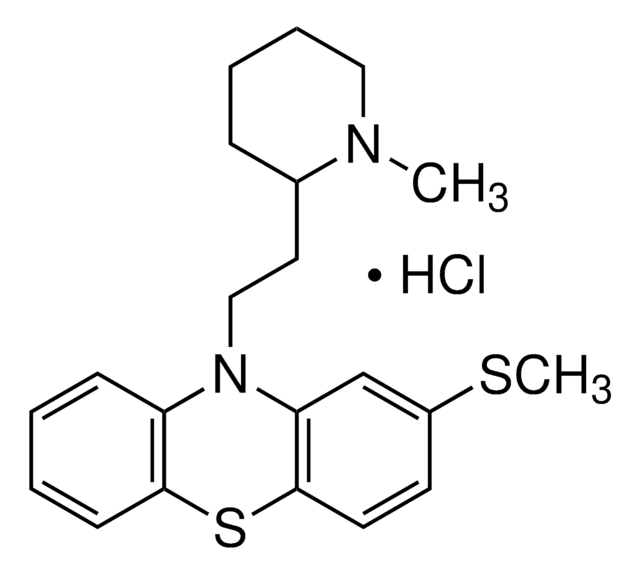C8138
Chlorpromazine hydrochloride
≥98% (TLC), powder, D2 dopamine receptor antagonist
Sinónimos:
2-Chloro-10-(3-dimethylaminopropyl)phenothiazine hydrochloride, CPZ, Largactil
About This Item
Productos recomendados
Nombre del producto
Chlorpromazine hydrochloride, ≥98% (TLC)
Quality Level
assay
≥98% (TLC)
form
powder
mp
194-196 °C
solubility
water: 50 mg/mL
originator
GlaxoSmithKline
SMILES string
Cl[H].CN(C)CCCN1c2ccccc2Sc3ccc(Cl)cc13
InChI
1S/C17H19ClN2S.ClH/c1-19(2)10-5-11-20-14-6-3-4-7-16(14)21-17-9-8-13(18)12-15(17)20;/h3-4,6-9,12H,5,10-11H2,1-2H3;1H
InChI key
FBSMERQALIEGJT-UHFFFAOYSA-N
Gene Information
human ... DRD2(1813) , DRD3(1814) , DRD4(1815) , HRH1(3269) , HTR2A(3356)
¿Está buscando productos similares? Visita Guía de comparación de productos
Application
- as an antagonists for calmodulin kinase
- as a medium supplement to test its cytotoxic effects in human lung microvascular endothelial cells (HMVEC-L)
- as an inhibitor of clathrin-mediated endocytosis in RAW 264.7 cells
Biochem/physiol Actions
Features and Benefits
signalword
Danger
hcodes
Hazard Classifications
Acute Tox. 1 Inhalation - Acute Tox. 3 Oral
Storage Class
6.1A - Combustible acute toxic Cat. 1 and 2 / very toxic hazardous materials
wgk_germany
WGK 3
flash_point_f
Not applicable
flash_point_c
Not applicable
ppe
Eyeshields, Faceshields, Gloves, type P3 (EN 143) respirator cartridges
Elija entre una de las versiones más recientes:
¿Ya tiene este producto?
Encuentre la documentación para los productos que ha comprado recientemente en la Biblioteca de documentos.
Los clientes también vieron
Nuestro equipo de científicos tiene experiencia en todas las áreas de investigación: Ciencias de la vida, Ciencia de los materiales, Síntesis química, Cromatografía, Analítica y muchas otras.
Póngase en contacto con el Servicio técnico












